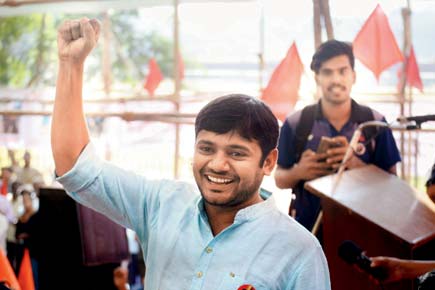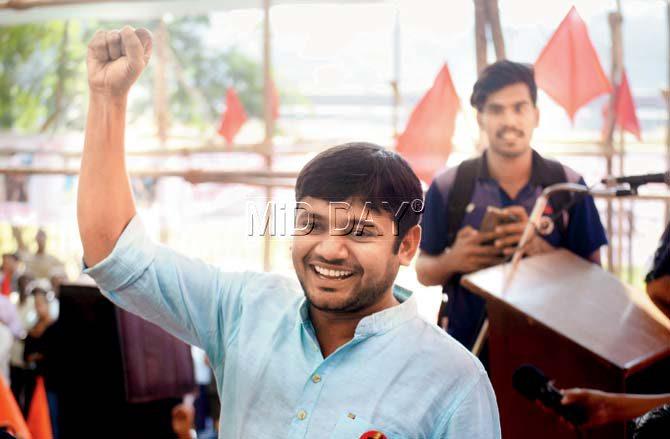Kanhaiyya Kumar, student leader from Delhi’s Jawaharlal Nehru University welcomes the decision to bring student elections back to Maharashtra after a gap of two decades


Kanhaiyya Kumar also attended the protest by thousands of conservancy workers demanding equal rights and minimum wages at Azad Maidan. They also shouted his famous Azaadi Naara. Pic/Sneha Kharabe
ADVERTISEMENT
Think student politics, and the first name to pop into your mind is likely Kanhaiyya Kumar, the star student leader from Jawaharlal Nehru University (JNU) who shot to fame after he was arrested under charges of sedition following a protest at the New Delhi campus of the institute.
In the city yesterday to support the ‘minimum wage’ movement started by the National Trade Union Initiative, Kanhaiya spoke to mid-day about the excitement over student elections returning to Maharashtra after a gap of over two decades.
Maharashtra will see the return of student elections after over two decades. What do you have to say about it?
I have heard from our representatives in Maharashtra about the return of student elections after the finalisation of the new Maharashtra Universities Act. It is a welcome decision. Students will have a representative on campus to voice their issues. We have been urging for youngsters’ involvement in politics since a long time.
What is AISF’s plan of action for the upcoming students’ elections in Maharashtra?
The Act has just been passed; we will speak about our plans when student elections actually resume on campuses here. While our local representatives will work on their plan of action, our focus will be on students’ issues without political or religious agenda — the way we have been fighting student elections at JNU.
Can you further elaborate on this?
At JNU, they have started a new course — diploma in Indian Culture. Why do we need this course when it is already included in history, culture studies and other related subjects? These are just ways for right-wing activists to bring their people inside campus and start a religious agenda. We hope that the student elections will be focused on development and not on religious politics. Issues such as progress of Dalit community, exploitation of reserved category students are among the important issues that need focus.
Does AISF lack a strong local leader in Mumbai? Is that why you come down from JNU?
That is not true. We have competent leaders here in Mumbai and across Maharashtra, who eventually will be working on plan of action for student elections here. I am here in Mumbai to show my support for the trade union movement.
What is your opinion on the demonetisation drive?
The Prime Minister said that the plan is to bring back black money. After demonetisation, when it was asked where is black money, PM said start using ‘PayTM’. A huge percentage of Indian society has already been living cashless, not by choice but because they do not have money. The poor are just getting poorer. Economic growth is decreasing — even the government has admitted this. Farmer suicides are increasing. How is this ‘achche din’ after demonetisation?
On election rules
“Even in Maharashtra, the Lyngdoh Committee recommendations would be followed for student elections. We strongly oppose it and hope that students in Maharashtra too extend their support in opposing it. The committee has made arbitrary recommendations, from the cap on expenses in student elections, to a limit on re-election. Students should be given liberty and power to conduct their own elections,” said Kanhaiya.
 Subscribe today by clicking the link and stay updated with the latest news!" Click here!
Subscribe today by clicking the link and stay updated with the latest news!" Click here!






